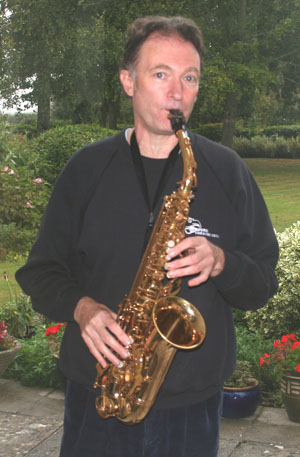Stephen’s Jazz Biog
I first took up the sax when I was at Lancaster University in the mid-1970s. A friend gave me an ancient Thibouville-Lamy C-melody sax, which was at the time being used as a flower pot. I cleaned it out, sent off for new pads and found it a mouthpiece. I couldn’t get the lowest notes and I couldn’t get the highest notes, and the notes inbetween took a lot of puff, but somehow I learnt how to get a few tunes out of the thing. I even had a few lessons, but was never much good at it.
To give you an idea how old it was – it had two separate octave keys, and you had to change your thumb from one to the other halfway up the upper register. All saxes since I suppose around 1900 have had an automatic mechanism that does this for you.
I now regret having given it away in 1994, when I also sold my Weltklang soprano sax to the professional player Liz Dennison. But I recently found a much better one, a Cleveland from the 1920s. It was a struggle finding a mouthpiece that would make it play in tune, but now it sounds great.
Why C-melody or C-tenor sax? While E-flat alto is very comfortable to play, the B-flat tenor is just too heavy round my neck. C-tenor comes midway between these two sizes – gives a deeper voice than alto without being a pain in the neck. Plus there’s the sentimental attachment to the kind of sax I first blew.
I took up sax again in 2004, when preparing for a production of Shakespeare’s play All’s Well That Ends Well with the Cakes and Ale Theatre Company (now sadly no longer active). The director, John O’Connor, happened to say that he liked music with a play, and he liked the sound of the sax (his production of The Canterbury Tales at the Oxford Playhouse, with script by himself and music by Roger Simmonds, had a small band on stage and so many musical numbers it was more a musical than a play).

I chirped up: oh yes, I used to play the sax… There followed a visit to Oxford’s sax shop, Allegro on Marston Road, and I came away with a second-hand Jupiter alto. Cheap and Taiwanese, but plays very easily. In the play, I used it to play snatches of “I Only Have Eyes For You” as Helena is choosing a husband from among the French lords (“this youthful parcel of noble bachelors”) in act II scene iii – the audience knows that really she only has eyes for Bertram.
I started practising in earnest in September 2005, after we’d finished A Midsummer Night’s Dream, in which I played Starveling (who himself plays the Man i’th Moon – which at John’s suggestion I did in an ancient 1950s version of a lunar spacesuit). Again I provided a gentle, seductive murmer of “I Only Have Eyes For You”, this time as Titania leads Bottom off to her fairy bower – her eyes are of course bewitched at this point – and this was very effective.
Then I discovered the magic of the Dave Brubeck Quartet. Brubeck’s jazz pieces each have a strong melody – especially his lovely ballads – followed by strong improvisations. I was most impressed by the man who took over the role of the late Paul Desmond in the band, Bobby Militello, who is absolutely fabulous on both alto sax and flute. His example gave me a direction, a sense of who I wanted to emulate in music, however imperfectly.
So that chance remark from John resulted in my picking up again a thread of my life which I had thought long dead and buried, and completely revised my priorities. Funny how a chance event like that sometimes has huge, and completely unpredictable, leverage on one’s subsequent life. The person you think you are is the product of many chance encounters and casual choices, and could so easily have turned out totally differently.
(The same is true in evolutionary biology, on a far vaster scale, of course. People who like to harp on about how Darwinian evolution makes nonsense of the meaning of human life are totally confused on this point. Yes, everything about us is the result of random circumstances, and yet we can still live, and there is still a direction of progress – whether personal, musical, scientific, technological or political.)